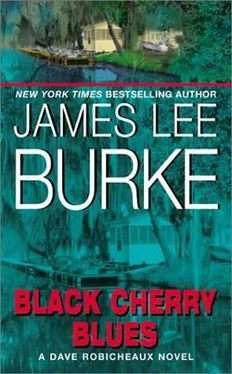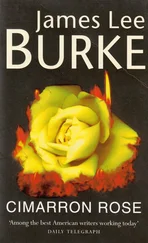"People hang up on me all the time. I expect it," I said.
"A Treasury agent once told me I had the telephone charm of Quasimodo."
"That purple lump on your head, that happened at your house yesterday?"
"I was careless. It'll be gone soon."
"You want to take Alafair out of school today and tomorrow?"
"That's right. She'll be back Thursday."
"Where are you going, if you don't mind my asking?"
"I have to take care of some business across the mountains."
"I'm very concerned about all this. You give me bad feelings. These men you talk about are evil, aren't they? But you seem almost cavalier."
"You're wrong about that, kiddo."
"I wish you wouldn't call me that."
"All right."
"Alafair is a wonderful little girl. I worry about her. I worry about your attitudes."
"She thinks the world of you, too. I don't want to be unpleasant or to upset you in any way, but I want you to understand something. Somebody sent me a used hypodermic needle and a letter and a photograph. I won't tell you what was in the photograph, but the person who wrote the letter said the needle had been used in a snuff film. His threat was not aimed at me. It was directed at Alafair. I believe he was serious, too.
"Now, in the movies potential murder or assault victims are given twenty-four-hour protection by the cops. But it doesn't happen that way. You're on your own. If you don't believe me, ask anybody who has been hunted down by a guy who they had locked up and who made bail by the next morning. They tell a great story. A lot of them tend to become NRA members."
Her green eyes were steady and intelligent. She was a good soldier and obviously was trying to look beyond the abrasive quality of my words; but I had gone over a line, almost like an emotional bully, and she wasn't up to handling it.
"I'll get Alafair for you," she said.
"Miss Regan… Tess, I'm at a real bad place in my life. I apologize for the way that I talk, but I'm really up against it. Don't make me walk out of here feeling like a shit."
But it was no use. She brushed past me, her hips creasing inside her knit dress, her eyes welling with tears.
Later that day Alafair and I drove into the clouds on the Divide. It rained hard and the trees looked thick and black in the wet light, and water sluiced off the road into the canyons far below. It was too late to get anything done at the Teton County courthouse, so we stayed the night at a motel in Choteau, the county seat.
The next day I found the connection between Sally Dee and the oil business. I found it all over the East Front, in Teton, Pondera, and Glacier counties. And I found out the service that Dixie Lee had been performing for him.
That evening I called Dan Nygurski at his house in Great Falls.
"Where've you been? I called you three times today," he said.
"Over here, east of the Divide."
"Now? Where?"
"Right outside of Great Falls."
"What are you doing right now?"
"Nothing. Going to a motel. I don't feel like driving back tonight."
"We're fixing to cook out in the backyard in a few minutes. You want to come over?"
"My little girl's with me."
"Bring her. We've got three kids she can play with. I've got some heavy stuff on Mapes that you ought to know about."
"The DEA had a file on him?"
"FBI. He was part of a kidnap investigation. You better come over."
He gave me his address and directions, and Alafair and I drove in the twilight to a 1950s suburb of split-level ranch homes, maple-lined streets, sprinklers twirling on the lawns, flower beds full of blue clematis, yellow and red roses, with tree bark packed on the dirt to prevent the growth of weeds. We sat on the redwood deck built out back, behind sliding glass doors, while Alafair played on a small seesaw with two of his little girls. The coals in his hibachi had already turned gray and hot before we arrived, and his wife brought out a tossed salad and a pitcher of iced tea on a tray, then laid a row of venison and elk steaks on the grill. The grease hissed and steamed off the coals and the smell was wonderful.
His wife was attractive and polite and had the same accent as he.
She wore makeup and a dress, and her eyes were shy when you looked too closely at them. She went back into the kitchen and began slicing a loaf of French bread on a cutting board.
"You're wondering why a woman who looks like that married a guy who looks like me," he said.
"Not at all."
"Come on, Robicheaux."
"Women have kind hearts."
"Yeah, they do," he said, and got up from his chair and closed the sliding glass door.
"So let's walk around the side of the house so nobody else has to hear what I have to tell you. In fact, maybe we ought to wait until after you've eaten."
"Let's do it."
We walked into his side yard, which was planted with apple trees and climbing red roses on trellises set in small circular beds. There were small, hard green apples in the leaves of the trees. A picket fence separated his yard from his neighbor's swimming pool. It was dusk now, and the reflection of the neighbor's porch light looked like a yellow balloon under the pool's surface. He picked up two metal chairs that were leaned against the side of his house and shook them open. His mouth twitched when he started to speak, and I saw the web of vein and sinew flex and pulse in his throat.
"Where'd your lawyer get his information on Mapes?"
"He hired a PI."
"Tell him to get your money back. The PI blew it. I suspect he checked the sheriff's and city police's office in Mapes's hometown, came up with the assault arrest, the golf club deal, when Mapes was seventeen, then sent your lawyer a bill for two days' services, which is usually about six hundred dollars. In the meantime he didn't check anything else."
"What's the story?"
"Look, you were a cop a long time. You know that once in a while you run across a guy, a guy who everybody thinks is normal, maybe a guy with an education, a good job, service record, a guy who doesn't focus much attention on himself. At least he doesn't give cops reason to think about him. But there's something wrong with him. The conscience isn't there, or maybe the feelings aren't.
But he's out there, in suburbs just like this, and he's the one who commits the murders that we never solve. I think that's your man Harry Mapes.
"In 1965 an eighteen-year-old soldier on leave from Fort Polk picked up his girlfriend in Tyler, Texas, and took her to a drive-in movie. Then it looks like they went out on a back road and parked behind an old greenhouse where somebody used to grow roses. At least that's where the sheriff's department found the girl's dress and underwear. They found the car five miles away in a creek bed. Somebody had torn the gas line loose and set it on fire. Both those kids were in the trunk. The pathologist said they were alive when it burned."
I leaned forward on the folding metal chair and picked a leaf from a rosebush. My throat felt tight. I could hear the children playing on the seesaw in the backyard.
"Mapes was involved?" I said.
"That's the big question. The fingerprints of another kid from Marshall were on the victims' car, but not Mapes's. But that would figure, if Mapes drove one car and the other kid drove the victims' car to the place where they burned it. Both of them were seen together earlier that night, and it took two people to pull it off, unless the kid they had dead-bang was on foot, which is improbable, since he owned a car and was driving around in it with Mapes earlier."
"The other kid didn't implicate Mapes?"
"He denied everything. Evidently he had a reputation around Marshall as a lunatic. Acid, speed, all that bullshit. In his cell he wrapped himself in toilet paper, soaked it in lighter fluid, and set himself on fire. It looked like good theater. But later on he showed everybody he was sincere. He unwrapped some wire from a broom and hanged himself.
Читать дальше












